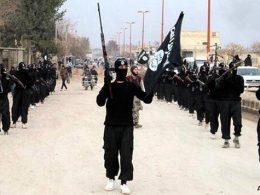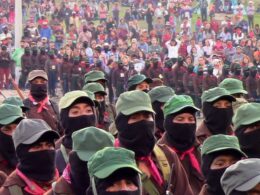After a month of social explosions across Spain with the 15-M movement, Spanish Politics has been turned upside down, and the situation continues to simmer. There will be further developments over the next months. There are numerous demonstrations and actions planned. However, for many, thoughts are already turning to the battle after the summer. Key questions are being asked. Will there be a general strike? What will become of 15-M?, And what political expression will the movement need to force a victory against capitalism and austerity?
There is no doubt that no organisation has been left un-touched by this fantastic movement. Capitalist establishment parties have been rocked. PSOE, already in crisis, has been even more discredited. Nationalist parties, such has CiU in Catalunya have become the focus of hatred, only months after coming to power. In the Basque country, the rise of Bildu, a new radical nationalist formation has shaken the traditional ruling parties there. The PP is preparing to take power from PSOE, as the main opposition party. The demands by some PP figures during the movement to “clear the squares” shows their vicious nature. These people are the heirs of Franco, working in a system which was not fundamentally altered by the ‘transition’ to democracy. The movement’s name, ‘Real Democracy Now’, implies that the current arrangement is undemocratic. This catches the mood of many people, disenchanted with the much-lauded “new democracy” of modern Spain. It is being said that Spanish people are waking up from a deep sleep. In many ways, this is true, with the class struggle exploding again after a period of economic boom and ‘social peace’.
New elections will take place within the next 9 months. The question is, how can the 15-M movement, and the workers and youth it represents, build an alternative to PSOE and PP governments of austerity and crisis? The situation across Spain is now very fluid. The possibilities for the development of a political organisation representing the needs and aspirations of the working class, the unemployed and young people are better now than before.
How could the Movement develop
The M-15 was a popular expression of anger against capitalism and its representatives, the bankers and ‘politicos’. It also revealed a huge anger and frustration with the left and trade union movement. The movement correctly understood that the PSOE and the PP are fundamentally the same, more than even some on the left are prepared to say! The movement has spread in other directions, such as fighting against housing repossessions and other issues. This is important as it could serve as the seeds for growth of the movement as a mass organised opposition to capitalism in all of its attacks on the majority.
Assemblies an expression of anger and the need for organisation
The early assemblies and ‘acampadas’ did show a glimpse of an alternative type of social system, with mass participation and involvement. But for some. the camps in the big cities were possibly seen as potential permanent models of a new society in the squares. This was not going to be sustainable. In reality, this idea represents a political tendency within the anti-capitalist movement. Some participants in the movement reject political organisations, trade unions and even the revolutionary left, in general. For most people involved in 15-M it was an opportunity to express their frustration with the existing political establishment, and the lack of a clear political expression of their interests being given. It was a reflection that the “traditional parties” of the working class were inadequate, or in the case of PSOE now completely capitalist and anti-worker. Their involvement in the movement and in popular assembles allowed thousands to feel like they were participating in making decisions and fighting back.
The spread of 15-M to communities
The general direction of the 15-M now is to sink roots within the local areas, forming assemblies in barrios. This is a correct move. Also the task of forging links with workers directly at the workplace is essential and that has also been happening in many areas. There is a important layer of potential new activists in the local area. 15-M could also unite many local campaigns and groups. The success of this process is key to 15-M having a long term impact on the situation in Spain but will also pose questions on how the movement is organised and what its future aims are.
Democracy in ’Real Democracy Now’
The truth is that in many important ways, organised democracy itself is missing from the movement at this stage. The spontaneous character of the movement has left it without some basic structures. The so called liquid and horizontal nature of this movement has been successful in using the internet and popular assemblies to express and organise the generalised anger of people. The level of coordination has been extremely impressive in some ways. But to build a movement capable of taking on capitalism, we must be more than a ‘spontaneous movement’ and try to respond to events in a unified and powerful way. This necessitates some elected democratic coordinating structures.
This does not mean loosing the inclusive, open and democratic methods that are at the heart of the movement. In fact these need to be strengthen and developed in all local areas and in workplaces. But an accountable regional and state-wide elected co-ordination would strengthen the moment.
Many anarchists and some activists would reject this. But time and time again methods that fail to unite people in an organised democratic way fail in the long run due to their inability to sustain and direct movements. Sometimes, different sections of the movement pull in different directions and have different plans. The struggle against austerity and capitalism needs firm, clear and well coordinated opposition. At its high moments 15-M spread like wild fire. But the lessons of Greece show us this is not a “one-summer battle”. This is going to be a hard fight and we need adequate organisation for the job.
SR argues that local assemblies should form and send elected representatives to city-wide or regional and state-wide assemblies. Assemblies should also be established in workplaces and universities and schools on the same basis. Theses leading bodies could agree basic manifestos and strategies. Delegates should not be fixed, they should always be able to be rotated recalled.
There should be allowance in the movement for tendencies and groups that support basic and democratically agreed demands of the movement to be recognised and debate alteratives to austerity and the capitalist system. This is democratic! Socialist groups and others should be honestly affiliated, not secretly active.
Questions such as who to vote for in next years elections will be posed. There will be a layer that will reject any standing in elections. But there will be others that see the importance of such a move. At this stage, Socialismo Revolucionario would encourage the democratic selection of 15-M candidates to stand on an agreed anti-capitalist programme, and the supporting of any genuinely left and anti-capitalist candidates who agree to the demands of the movement and are accountable to it.
Many IU activists have been involved in the movement and some leaders such as Cayo Lara have attempted to link the party with the movement. But the IU has been seen as the same as the other political parties. Which direction the IU takes in the near future is important. There are now likely to be rifts within the IU as the earthquake of M-15 makes its imprint.
United left announce new election platform…..with Greens?
The state wide leadership of IU have used this movement to call for a new alliance on a state-wide bases for the general election, calling for a broad base moment for the general election called “amplia alianza por el cambio político, ecológico y social” (broad coalition for political ecological and social change). It is intended that this broad base could win the some people who adhere to the 15-M movement. They use the model in Catalonia with the alliance with the ICV (Iniciative for green catalonia) as a model for a broader front. It is true that if this new front took a clear fighting socialist programme then many activists from 15-M could be attracted but the lessons of Catalonia are the opposite.
The represenatives of ICV-EUA-IAC (IU in Catalonia) entered the parliament on 15 June while thousands of youth attempted to block parliament to halt a vote on cuts. This isolated the ICV-EUA from the movement as did comments from some ICV-EUA leaders. The chant of “not even you represent us” could be heard as their MPs passed. This is not surprising. Until recently they were part of an 8 year tripartite government of Catalonia which introduced many anti-worker measures. The ICV-EUA are damaged as a fighting opposition. The experience of ICV, being a more moderate and electoralist wing of the IU, has proved to be negative.
IU in Extremadura don’t vote for PSOE
In Extremadura, region the IU minority that were elected did not support the PSOE minority as they have done for years and which is general practice across the state of Spain. This caused fury amongst state-wide United left leaders but it shows that some in the IU have drawn the conclusion that PP and PSOE are fundamentally the same and that the mass of people can understand this. If this model was followed across the state of Spain alongside a clear socialist programme as outlined by Socialismo Revolucionario (SR – CWI) it might be possible to win the working class and the Indignados to the to the banner of the IU and build for a government that represent the interests of workers class people. The most important question for the development, or not, of political parties is the programme they have and popularise, their answers to the problems of people. If the IU continues to fail to distinguish itself from the establishment parties by taking a radical turn to the left, transforming itself into a mass, democratic organisation based on the growing struggles, then it will be completely passed by by history, with workers and youth in struggle against austerity and capitalism, moving to form new formations to give their thoughts and beliefs a collective political expression.
Trade unions
The main trade unions leaders sell out on the pact with bosses and the government, the de-mobilising of the struggle after the 29 September general strike and continuing to support the idea of consensus with the capitalist, has added further to the frustration and the feeling that unions are part of the establishment. They were bypassed in many respects in the short term by 15-M. But the latent power of the Unions is enormous. In the last days before J-19 it was clear that local trade unionists had built heavily for the demonstrations. This was reflected in large turnout of older workers. This in reality forced the trade union leaders to officially support the demos. In comparison, the official demonstrations against the Euro pact two days after 19-J later were pitiful in size. There is now going to be turmoil from below. Workers will draw confidence from the 15-M and the battle on the industrial field will soon explode, probably in the autumn but possibly before. The call for general strike to pull the movement together is increasing. It was a official demand of the massive Barcelona demonstration on 19 June.
To force a new general strike and change the main unions there needs to be an organised “real democracy” struggle within the trade unions. There will be groups of trade unionists and genuine socialists uniting to force the trade unions to do what they were built for – fighting capitalism and defending working class people. SR will support any genuine moves in this direction. There are also a number of alternative, syndicalist and nationalist Unions which general have a more progressive and fighting position. It is possible that these unions could be strengthened in the short term. The need to link fighting unions with a political expression is also needed. Work place 15-M assemblies could unite activists from all unions and none and push the unions to fight against capitalism..
A world to win
The next period in Spain, Europe and the world is going to one of battles against capitalism. The process of workers and youth finding there voice and forming new organizations of struggle will continue. The CWI is involved in the struggle across the world fighting to inject the genuine ideas of revolutionary socialism into these processes and build a revolutionary political organisation on a world scale capable of finally ridding mankind of the horrors of the dictatorship of capitalism.











